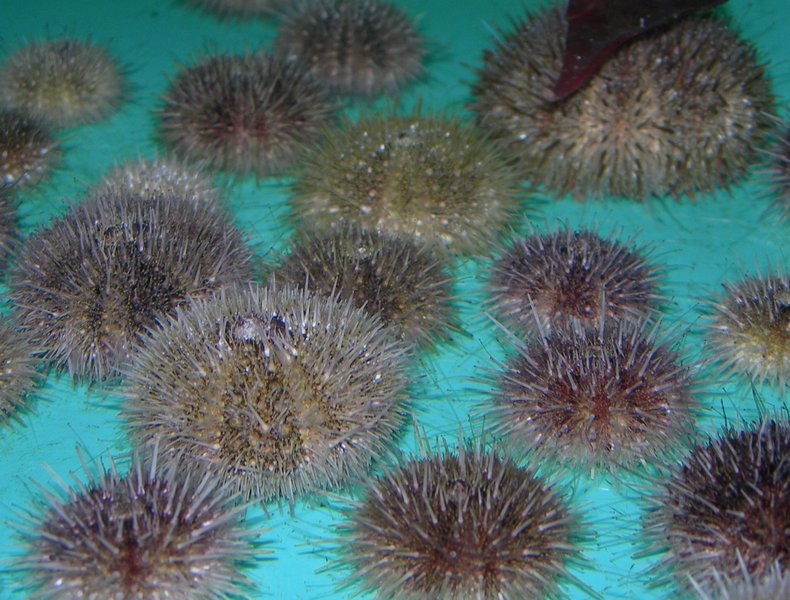Global Warming Causes 'Acid Indigestion' for Sea Urchins

Get the world’s most fascinating discoveries delivered straight to your inbox.
You are now subscribed
Your newsletter sign-up was successful
Want to add more newsletters?
Join the club
Get full access to premium articles, exclusive features and a growing list of member rewards.
Spiny green sea urchins face a new challenge from climate change: As the oceans become more acidic, urchin larvae struggle to digest their food, new research finds.
The study is the first to prove that ocean acidification can cause digestive problems for marine animals, though scientists have long been alarmed at the trend for other reasons. Ocean acidification has threatened oyster farms, slowed coral growth and caused common marine snails to shrink, among other effects.
Earlier studies have focused on calcification, or the process by which marine animals draw minerals from the water to build shells and skeletons, study researcher Meike Stumpp, a former Ph.D. student at the GEOMAR Helmholtz Centre for Ocean Research and the University of Kiel in Germany, said in a statement.
"Other vital processes — such as digestion and gastric pH regulation — were neglected," Stumpp said. Gastric pH is the level of acidity in the digestive system. "We can now demonstrate that they deserve much more attention," she said.
Warming climate, acidifying oceans
As levels of carbon dioxide in the atmosphere increase — driven by the burning of fossil fuels — the oceans act as a sponge, taking up some of the extra carbon dioxide. The result is carbonic acid, which decreases the overall pH of the oceans. Since the Industrial Revolution, the ocean has become about 25 to 30 percent more acidic, scientists estimate. [Top 10 Surprising Results of Global Warming]
Acidification eats away at minerals used by corals to build their skeletons and other animals to build their shells. But Stumpp and her colleagues were concerned with another part of the life cycle. Many marine animals start their lives as larvae, which are very exposed to the ocean environment. In particular, the larvae of the green sea urchin (Strongylocentrotus droebachiensis) have a digestive system that is bathed in ocean water.
Get the world’s most fascinating discoveries delivered straight to your inbox.
Humans and other mammals have acidic gastric juices with a pH measurement of around 2, similar to the acidity level of lemon juice. Sea-urchin larvae, in contrast, have very basic, or alkaline, digestive juices — about 9.5 on the 14-point pH scale. Historically, ocean pH was about 8.16 on the pH scale, making it slightly less basic than urchin digestive juices.
Digestive problems
Stumpp and her colleagues exposed sea-urchin larvae to slightly more acidic seawater, calibrated to be at a pH level of 7.7 and 7.4. On the pH scale, 7 is neutral, so the seawater was still slightly basic.
Because the larval digestive system is exposed to the outside environment, the more acidic water caused a decrease in gastric-juice pH of about 0.3 to 0.5, the researchers report Oct. 20 online in the journal Nature Climate Change.
In the more acidic environment, the enzymes that digest food don't work as well. As a result, the researchers found, urchin larvae in acidic water ate 11 percent to 33 percent more than those in ideal water conditions.
"If the organisms are unable to compensate for extra costs caused by ocean acidification by eating more, they suffer negative consequences in the form of reduced growth and fertility, and in extreme cases, death," study researcher Sam Dupont, of the University of Gothenburg in Sweden, said in a statement.
Green sea urchins are a key species in kelp forests in temperate and subpolar oceans, so their health and survival is crucial for the entire ecosystem, the researchers wrote. More studies of keystone species are needed, they added — especially in the vulnerable larval stage.
Follow Stephanie Pappas on Twitter and Google+. Follow us @livescience, Facebook & Google+. Original article on LiveScience.

Stephanie Pappas is a contributing writer for Live Science, covering topics ranging from geoscience to archaeology to the human brain and behavior. She was previously a senior writer for Live Science but is now a freelancer based in Denver, Colorado, and regularly contributes to Scientific American and The Monitor, the monthly magazine of the American Psychological Association. Stephanie received a bachelor's degree in psychology from the University of South Carolina and a graduate certificate in science communication from the University of California, Santa Cruz.
 Live Science Plus
Live Science Plus










